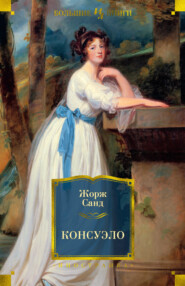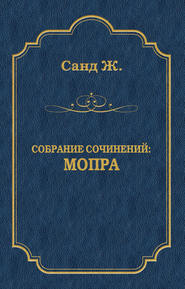По всем вопросам обращайтесь на: info@litportal.ru
(©) 2003-2024.
✖
The George Sand-Gustave Flaubert Letters
Настройки чтения
Размер шрифта
Высота строк
Поля
God be thanked, "of my horrible sight I purge their States."
CCLXXXII. TO GEORGE SAND
Saturday, 26 September, 1874
Then, after having been bored like an ass on the top of the Righi, I returned home the first of August and started my book. The beginning was not easy, it was even "direful," and "methought" I should die of despair; but now things are going, I am all right, come what may! But one needs to be absolutely mad to undertake such a book. I fear that, by its very conception, it is radically impossible. We shall see, Ah! supposing I should carry it out well … what a dream.
You doubtless know that once more I am exposing myself to the storms of the footlights (pretty metaphor) and that "braving the publicity of the theatre" I shall appear upon the boards of Cluny, probably, towards the end of December. The manager of that "little theatre" is enchanted with le Sexe faible. But so was Carvalho, which did not prevent him … You know the rest.
Of course every one blames me for letting my play be given in such a joint. But since the others do not want that play and since I insist that it shall be presented to make a few sous for the Bouilhet heirs, I am forced to pass that over. I am keeping two or three pretty anecdotes about this to tell you when we meet. Why is the theatre such a general cause of delirium? Once one is on that ground, ordinary conditions are changed. If one has had the misfortune (slight) not to succeed, friends turn from one. They are very inconsiderate of one. They never salute one! I swear to you on my word of honor that that happened to me on account of le Candida. I do not believe in Holbachic conspiracies, but all that they have done to me since March amazes me. But, I decidedly don't bat an optic, and the fate of le Sexe faible disturbs me less than the least of the phrases of my novel.
Public intelligence seems to me to get lower and lower! To what depth of imbecility shall we descend? Belot's last book sold eight thousand copies in two weeks. Zola's Conquete de Plassans, seventeen hundred in six months, and there was an article about it. All the Monday-morning idiots have just been swooning away about M. Scribe's Une Chaine. France is ill, very ill, whatever they say; and my thoughts are more and more the color of ebony.
However, there are some pretty comic elements: (1) the Bazaine escape with the episode of the sentinel; (2) l'Histoire d'un Diamant by Paul de Musset (see the Revue des Deux Mondes for September); (3) the vestibule of the former establishment of Nadar near Old England [sic], where one can contemplate a life-size photograph of Alexander Dumas.
I am sure that you are finding me grouchy and that you are going to answer me: "What difference does all that make?" But everything makes a difference, and we are dying of humbug, of ignorance, of self-confidence, of scorn of grandeur, of love of banality, and imbecile babble.
"Europe which hates us, looks at us and laughs," said Ruy Blas. My
Heavens, she has a right to laugh.
CCLXXXIII TO GUSTAVE FLAUBERT
Nohant, 5th November, 1874
What, my Cruchard, you have been ill? That is what I feared, I who live in the woes of indigestion and yet hardly work at all, I am disquieted at your kind of life, the excess of intellectual expenditure and the seclusion. In spite of the charm that I have proved and appreciated at Croisset, I fear for you that solitude where you have no longer anyone to remind you that you must eat, drink and sleep, and above all walk. Your rainy climate makes you keep to the house. Here, where it does not rain enough, we are at least hustled out of doors by the beautiful warm sun and that Phoebus invigorates us, while our Phoebus-Apollo murders us.
But I am always talking to you as to a Cruchard philosophic and detached from his personality, to a Cruchard fanatical about literature and drunk with production. When, then, shall you be able to say to yourself: Lo! this is the time for rest, let us taste the innocent pleasure of living for life's sake, of watching with amazement the agitations of others and of not giving to them anything except the excess of our overflow. It does one good to ruminate over what one has assimilated in life, sometimes without attention and without discrimination.
Old friendships sustain us and all at once they distress us. I have just lost my poor blind Duvernet, whom you have seen at our house. He expired very quietly without suspecting it and without suffering. There is another great void about us and my nephew, the substitute, has been nominated for Chateauroux. His mother has followed him.
So we are all alone. Happily we love one another so much that we can live like that, but not without regret for the absent ones. Plauchut left us yesterday to return at Christmas. Maurice is already at work preparing a splendid performance of marionettes for us. And you, if you are in Paris, won't you come to keep the Christmas Eve revels with us? You will have finished your rehearsals, you will have had a success, perhaps you will be in the mood to return to material life, eating truffles?
Tell us about yourself, do not be ill, always love your old troubadour and his people who love you too.
G. Sand
CCLXXXIV. TO GEORGE SAND
Wednesday, 2nd December, 1874
I am having remorse about you. It is a crime to let so long a time elapse without answering such a letter as your last. I was waiting to write to you until I had something definite to tell you about le Sexe faible. What is definite is that I took it away from the Cluny a week ago. The cast that Weinschenk proposed to me was odiously stupid and he did not keep the promises that he made. But, God be thanked, I withdrew in time. At present my play has been offered to the Gymnase. No news up to now from Montigny.
I am worrying like five hundred devils about my book, asking myself sometimes if I am not mad to have undertaken it. But, like Thomas Diafoirus, I am stiffening myself against the difficulties of execution which are frightful. I need to learn a heap of things about which I am ignorant. In a month I hope to finish with the agriculture and the gardening, and I shall only then be at the second third of my first chapter.
Speaking of books, do read Fromont et Risler, by my friend Daudet, and les Diaboliques, by my enemy Barbey d'Aurevilly. You will writhe with laughter. It is perhaps owing to the perversity of my mind, which likes unhealthy things, but the latter work seemed to me extremely amusing; it is the last word in the involuntary grotesque. In other respects, dead calm, France is sinking gently like a rotten hulk, and the hope of salvage, even for the staunchest, seems chimerical. You need to be here, in Paris, to have an idea of the universal depression, of the stupidity, of the decrepitude in which we are floundering.
The sentiment of that agony penetrates me and I am sad enough to die. When I am not torturing myself about my work, I am groaning about myself. That is the truth. In my leisure moments, all I do is to think of the dead, and I am going to say a very pretentious thing to you. No one understands me; I belong to another world. The men of my profession are so little of my profession! There is hardly anyone except Victor Hugo with whom I can talk of what interests me. Day before yesterday he recited by heart to me from Boileau and from Tacitus. That was like a gift to me, the thing is so rare. Moreover, the days when there are not politicians at his house, he is an adorable man.
CCLXXXV. TO GUSTAVE FLAUBERT, at Croissset
Nohant, 8th December, 1874
Poor dear friend,
I love you all the more because you are growing more unhappy. How you torment yourself, and how you disturb yourself about life! for all of which you complain, is life; it has never been better for anyone or in any time. One feels it more or less, one understands it more or less, one suffers with it more or less, and the more one is in advance of the age one lives in, the more one suffers. We pass like shadows on a background of clouds which the sun seldom pierces, and we cry ceaselessly for the sun which can do no more for us. It is for us to clear away our clouds.
You love literature too much; it will destroy you and you will not destroy the imbecility of the human race. Poor dear! imbecility, that, for my part, I do not hate, that I regard with maternal eyes: for it is a childhood and all childhood is sacred. What hatred you have devoted to it! what warfare you wage on it!
You have too much knowledge and intelligence, you forget that there is something above art: namely, wisdom, of which art at its apogee is only the expression. Wisdom comprehends all: beauty, truth, goodness, enthusiasm, in consequence. It teaches us to see outside of ourselves, something more elevated than is in ourselves, and to assimilate it little by little, through contemplation and admiration.
But I shall not succeed in changing you. I shall not even succeed in making you understand how I envisage and how I lay hold upon HAPPINESS, that is to say, the acceptation of life whatever it may be! There is one person who could change you and save you, that is father Hugo; for he has one side on which he is a great philosopher, while at the same time he is the great artist that you require and that I am not. You must see him often. I believe that he will quiet you: I have not enough tempest in me now for you to understand me. As for him, I think that he has kept his thunderbolts and that he has all the same acquired the gentleness and the compassion of age.
See him, see him often and tell him your troubles, which are great, I see that, and which turn too much to spleen. You think too much of the dead, you think that they have too soon reached their rest. They have not. They are like us, they are searching. They labor in the search.
Every one is well, and embraces you. As for me, I do not get well, but I have hopes, well or not, to keep on still so as to bring up my grandchildren, and to love you as long as I have a breath left.
G. Sand
CCLXXXVI. TO GUSTAVE FLAUBERT, at Croissset
Nohant, 16th January, 1875
I too, dear Cruchard, embrace you at the New Year, and wish that you may have a tolerable one, since you do not care to hear the myth happiness spoken of. You admire my serenity; it does not come from my depths, it comes from my necessity of thinking only of others. There is but a little time left, old age creeps on and death is pushing me by the shoulders.
I am as yet, if not necessary, at least extremely useful, and I shall go on as long as I have a breath, thinking, talking, working for them.
Duty is the master of masters, it is the real Zeus of modern times, the son of Time, and has become his master. It is that which lives and acts outside of all the agitations of the world. It does not reason, does not discuss. It examines without fear, it walks without looking behind it; Cronos, the stupid, swallowed stones, Zeus breaks them with the lightning, and the lightning is the will. I am not a philosopher, I am a servant of Zeus, who takes away half of their souls from slaves, but who leaves them entire to the brave.
I have no more leisure to think of myself, to dream of discouraging things, to despair of human-kind, to look at my past sorrows and joys and to summon death.
Mercy! If one were an egoist, one would see it approach with joy; it is so easy to sleep in nothingness, or to awaken in a better life! for it opens these two hypotheses, or to express it better, this antithesis.
But, for the one who must continue working, death must not be summoned before the hour when exhaustion opens the doors of liberty. You have had no children. It is the punishment of those who wish to be too independent; but that suffering is nevertheless a glory for those who vow themselves to Apollo. Then do not complain for having to grub, and describe your martyrdom to us; there is a fine book to be written about that.
You say that Renan is despairing; for my part, I don't believe that: I believe that he is suffering as are all those who look high and far ahead; but he ought to have strength in proportion to his vision. Napoleon shares his ideas, he does well if he shares them all. He has written me a very wise and good letter. He now sees relative safety in a wise republic, and I, too, think it still possible. It will be very bourgeois and not very ideal, but one has to begin at the beginning. We artists have no patience at all. We want the Abbey of Theleme at once; but before saying, "Do what you want!" one must go through with "Do what you can!" I love you and I embrace you with all my heart, my dear Polycarp. My children large and small join with me.
Come now, no weakness! We all ought to be examples to our friends, our neighbors, our fellow citizens. And how about me, don't you think that I need help and support in my long task that is not yet finished? Don't you love anyone, not even your old troubadour, who still sings, and often weeps, but who conceals himself when he weeps, as cats do when they die?
CCLXXXVII. TO GEORGE SAND
Paris, Saturday evening
Dear master,
I curse once more THE DRAMATIC MANIA and the pleasure that certain people have in announcing remarkable news! Someone had told me that you were VERY ill. Your good handwriting came to reassure me yesterday morning, and this morning I have received the letter from Maurice, so the Lord be praised!
What to tell you about myself? I am not stiff, I have … I don't know what. Bromide of potassium has calmed me and given me eczema on the middle of my forehead.

















